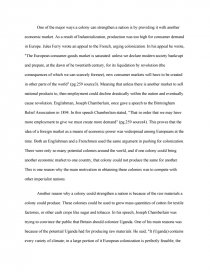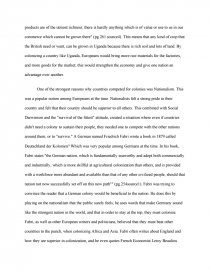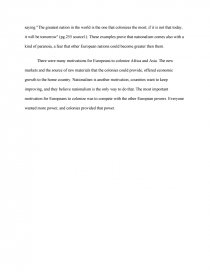Asd
Essay by review • March 29, 2011 • Essay • 816 Words (4 Pages) • 1,016 Views
One of the major ways a colony can strengthen a nation is by providing it with another economic market. As a result of Industrialization, production was too high for consumer demand in Europe. Jules Ferry wrote an appeal to the French, urging colonization. In his appeal he wrote, "The European consumer-goods market is saturated: unless we declare modern society bankrupt and prepare, at the dawn of he twentieth century, for its liquidation by revolution (the consequences of which we can scarcely foresee), new consumer markets will have to be created in other parts of the world" (pg.259 source3). Meaning that unless there is another market to sell national products to, then employment could decline drastically within the nation and eventually cause revolution. Englishman, Joseph Chamberlain, once gave a speech to the Birmingham Relief Association in 1894. In this speech Chamberlain stated, "That in order that we may have more employment to give we must create more demand" (pg.259 source4). This proves that the idea of a foreign market as a means of economic power was widespread among Europeans at the time. Both an Englishman and a Frenchmen used the same argument in pushing for colonization. There were only so many potential colonies around the world, and if one colony could bring another economic market to one country, that colony could not produce the same for another. This is one reason why the main motivation in obtaining these colonies was to compete with other imperialist nations.
Another reason why a colony could strengthen a nation is because of the raw materials a colony could produce. These colonies could be used to grow mass quantities of cotton for textile factories, or other cash crops like sugar and tobacco. In his speech, Joseph Chamberlain was trying to convince the public that Britain should colonize Uganda. One of his main reasons was because of the potential Uganda had for producing raw materials. He said, "It (Uganda) contains every variety of climate; in a large portion of it European colonization is perfectly feasible; the products are of the utmost richness; there is hardly anything which is of value or use to us in our commerce which cannot be grown there" (pg.261 source4). This means that any kind of crop that the British need or want, can be grown in Uganda because there is rich soil and lots of land. By colonizing a country like Uganda, Europeans would bring more raw materials for the factories, and more goods for the market; this would strengthen the economy and give one nation an advantage over another.
One of the strongest reasons why countries competed for colonies was Nationalism. This was a popular notion among Europeans at the time. Nationalists felt a strong pride in their country and felt that their country should be superior to all others. This combined with Social Darwinism and the "survival of the fittest" attitude, created a situation where even if countries didn't need a colony
...
...


